Regardless of the purpose of the website, NO eCommerce store will remain successful without CMS. So, what is the best CMS for eCommerce?
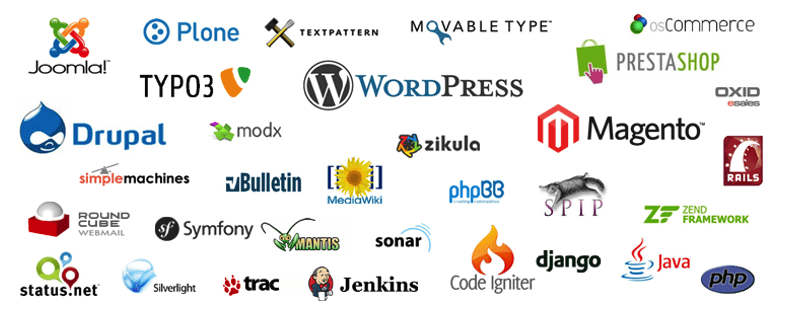
The eCommerce industry is the biggest revenue sector in the world today. This is because most people prefer buying online than stress themselves going to shopping malls, supermarkets, and other sales outlets. eCommerce has also seen the most increase in entrepreneurs trying to establish a base in the already crowded eCommerce scene.
However, the big names clearly have their acts together. They deliver quality products and exceptional customer service, so upcoming eCommerce startups need to equip themselves with the right market tool to succeed. Today online stores seek out the best CMS for eCommerce, not just to compete with the big names, but to deliver a reliable and top-notch customer shopping experience. These CMS for eCommerce are opening countless possibilities and creating endless opportunities for businesses to earn and remain sustainable over time.
It has become a standard for online stores to have an efficient CMS eCommerce. However, choosing the right one will strengthen your online presence. It is that simple and you must keep up with the latest eCommerce trends no matter what. Having a trustworthy eCommerce CMS is being battled ready for the hurdles associated with running an online store.
Are you having a hard time choosing from the best CMS for eCommerce for your online store? You are indeed lucky Ecomitize Website Development Service is your one-stop-shop for all things eCommerce. We provide the appropriate service for you. Additionally, we offer a premium support system to help you to grow your business as soon as you start selling online.
What is CMS?
Who would have thought the introduction of the World Wide Web will change the business scene as we see it today? As organizations, establishments, small, medium, and large trading companies scramble for customers and try to make sales, web applications are becoming significant. Most businesses are willing to spend the extra money, go the miles, and more to be visible, impactful, and usable online. This drive and thirst for online success birthed CMS – Content Management System.
Since CMS burst into the limelight, it has become the most popular way for online stores to set up their websites. They allow customization, editing, and ease of use. Today CMS solution for eCommerce is everywhere and changing the landscape, one support structure at a time. CMS is mostly applied in the IT and computing world.
This allows for shared data, monitoring, and tracking of information to flow as it relates to your online store. The fundamental of CMS is simple – give an online entrepreneur the marketing tool to help them succeed. How you decide to use this tool is your business. Today, there are plenty of CMS eCommerce options to choose from – open source eCommerce CMS, free eCommerce CMS, CMS shopping cart, and the list is on and on. The question, though, is, which eCommerce CMS is best for your online store?
Why should you incorporate CMS in your eCommerce business today?
Content is king, they say, and your website or online store is a content warehouse and hence the importance of CMS to your business. According to the Content Marketing Institute, 91 percent of B2B marketers use content marketing strategies to expand their customer base. Even more, 72% of marketers agree that CMS increases customer engagement and the success of online stores. The ability to control, create, modify, manage, distribute, and publish content tailored for your website drives the use of CMS in eCommerce. Whether you are adjusting or tweaking the appearance of your website, CMS is what leading eCommerce companies use to attract more customers. Furthermore, CMS for eCommerce allows online store owners to operate fully functional websites without the need for any technical knowledge. So whether pre-built or customized, these are five reasons you need the best CMS for eCommerce today.
Special access to your website
Consider a website like a house; without doors, everyone has access to the items inside. This means your furniture, fitting, and other personal and vital documents are at the mercy of visitors, and you cannot do anything about it. However, CMS is that tool that allows you to fix doors and create a security system around your house. Now visitors looking to gain access past the porch (homepage) need permission (membership) to get into the home.
Your furniture and other items are your content that membership allows visitors to see. Furthermore, by stretching the power of CMS eCommerce, you can close some rooms and require more action and response from visitors. CMS is that tool with sub-tools to ensure you have not only total control of your website but can direct customers on the next action to take to your benefit.
Content Designer
CMS allows you to create, design and showcase beautifully crafted content on your website. Although many CMS platforms only provide WYSIWYG editors, there are more extensive options available today. Most CMS for eCommerce have default templates and widgets where you just insert what you want and publish. Others have a broad range of tools to help you create unique content suited for your website. In choosing a CMS for eCommerce, it is paramount to ensure it can be mobile optimized, or else you will lose customers who shop from their phones. Finally, the right CMS will improve you good Google ranking, make your website SEO compliant and increase user usability.
Theme Builder
Themes are what add color and finesse to a page while delivering your message. Most CMS platforms offer free eCommerce CMS and premium CMS where customers pay a token to gain access to more sophisticated themes. If you are just starting an e-commerce store, you will likely settle for less, but if you desire to build and succeed, a little payment will give you access to all the themes needed to make your page different. Themes include colors, different skins, templates and small things like the arrangement of the text and how they play or blend into one another.
Integration
CMS is just software, and until it is integrated into an existing system, it will not be functional. The integration allows you to streamlined actions on your website. For example, a CMS shopping cart is specifically created to enable visitors to use the shopping cart option on your website. By using simple widgets, products are displayed on the page with a cart beside them. This increases the user’s shopping experience.
CMS Management
Most CMS for eCommerce require some form of computer knowledge; they are easy to handle by even novices. To get ahead with CMS, an entrepreneur must know how to set up, build, add, change, install, and do more on a platform or server. This allows your website to be up-to-date and eliminates the need for external developers. However, that is not the case, as most online store owners do not have an atom of computer knowledge hence need professionals to get it right.
CMS is significant in e-commerce to create and improve the shopping experience of your website. Your online store is like a real store; if you do not manage it, it will fold up someday. The same ideology applies here. Since we cannot be virtual, CMS does the job while we give the command. Running an online store is simple with CMS. It allows for seamless customer-owner interaction, creates engaging ambiances that bring them back, and puts money in your pocket.
Understanding CMS E-Commerce
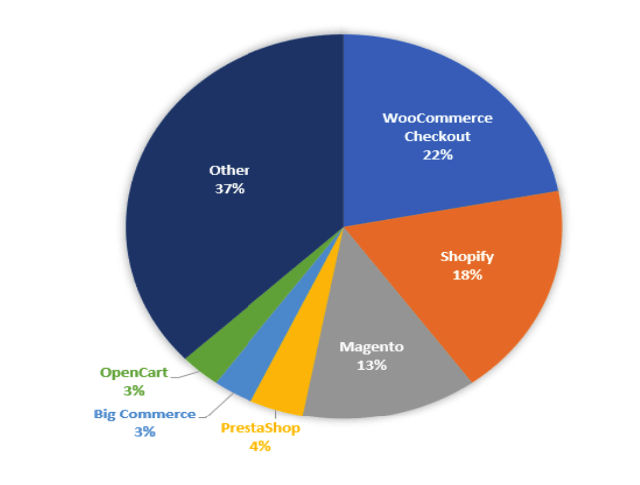
E-commerce is now the most certified and reliable way of buying and selling online. While it is a tough competition for regular stores (brick and mortar), it has bred aggressive price battles and business strategies aimed at retaining customers. The possibilities of e-commerce would never be possible without CMS, as now stores can convey accurate and precise information to the consumers. CMS has improved content creation over the internet by making them enticing and appealing to the customer and boosting sales.
CMS, a content management system, consists of two functional elements – the CMA (content management application) and CDA (content delivery application). The former allows anyone, regardless of their knowledge of Webmaster of HTML, to remove, change, modify, and create content for a website. CDA enables information on a website to be updated efficiently without hiccups. It is the component that works behind the scenes to ensure the frontend is looking good and delivering as supposed to.
CMS will not work without a website, and there are two options for building e-commerce websites today. They are via a hosted e-commerce platform or open-source CMS platforms. While both are effective, it all depends on your technical know-how and type of e-commerce website.
Hosted eCommerce Platforms
As the name suggests, these are eCommerce sites based on a Software-as-a-service system or SaaS. Stores can sign up with the platform; run their shops without having access to the server or coding software. Despite this seeming setback, it has some excellent benefits such as:
- Zero maintenance and development needs as the host arranges and cares for all problems that might arise at any time.
- They have the best technical support – because they monitor all sites using the platform, they can provide instant help in case of troubles.
- Extremely user-friendly and no technical hiccups – this gives access to people with no computer or coding knowledge to strive by concentrating on their stores. Examples of hosted eCommerce platforms are Shopify, BigCommerce, Wix, Squarespace, and Site123, among others.
Open-Source (self hosted) E-Commerce platform
An open-source eCommerce CMS offers more liberty to manage and modify your website. Let’s just say if you are looking to gain full control of your online shop, this is the platform to choose. However, you need some computer and coding knowledge or get a good developer to help you out.
The benefits include:
- Ability to customize – create content, edit the theme, make changes and it will not limit you or what you seek to do.
- Superior functionality – explore countless plugins, themes, add-ons on any type of store from simple to complicated ones seamlessly.
- Increase or decrease product number – because they are self-hosted, you have absolute control over what is, and can be done on your website, including product addition or removal.
- Excellent Community System – whether hosted or self-hosted, CMS eCommerce platforms have incredible support service that aids new users. Here you can ask questions and get an answer from real-time users. Examples of open-source c-commerce CMS platforms are Magneto, osCommerce, Opencart, Nopcommerce, etc.
The Best eCommerce Platform 2020
Magento – The Best CMS eCommerce Platform for Everybody
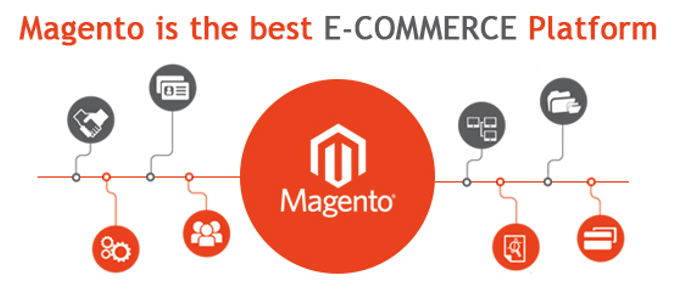
Magento open source e-commerce CMS is the best solution for businesses and marketers looking to gain full control of their eCommerce website. As one of the fastest-growing CMS platforms, Magento is used by most online stores because of its numerous features. Developed and launched in 2008 by Varien, the company has gone ahead to become the most sought after eCommerce CMA platform today. It has built a very functional platform using Zend PHP and MySQL databases.
In 2010 the company was acquired by the eCommerce mogul site eBay Inc. and now operates as one of its sectors. Today Magento has an impressive resume, and according to W3Techs, it powers 1% of the internet and controls about 1.9 percent of the CMS markets. Magneto has its largest customer base in the US, with over 11 percent of websites using the platform.
This does not include its immense popularity in Russia, Europe, India, Africa, and South America. Although it is the most used and popular CMS eCommerce platform, it is second to WooCommerce. According to statistics from the Magento team, there are over a quarter of a million users on the platform.
Some Features that have singled Magento out
Magento has two CMS for eCommerce platforms, namely the Magento Community Edition and the Magento Enterprise Edition. We are going to make a general list of the features as it applies to the platform.
Features
- Incredible flexibility including marketing & promotion tools
- Multi-currency and language features
- Seamless integration protocol on any website
- SEO optimized and analytical report
- Easily customizable
- Sales statistics
Pros
- Mobile friendly with plenty of customizable ability
- Supports a broad range of shipping methods
- Ability to work with multiple units at the same time
- Excellent community support structure
Cons
- No specific code or language to add modules to the platform
- It has a learning curve, and there are few Magento developers out there that know about the coding language. Despite all the good rave about Magento, its database is too large and technically difficult.
Some companies that use Magento are Nike, Adidas, Cox & Cox, Sigma Beauty, Land Rover, Liverpool FC, and many more.
Shopify – The Giant of The eCommerce World

With over a million businesses in over 175 countries worldwide, you know they must be doing something right. Perhaps one factor that has set Shopify apart is its incredible CMS shopping cart feature. Shopify is a CMS for eCommerce platform designed to help online stores sell by forcefully reminding customers that they are yet to check out their carts. This has made it a tremendous success in addition to the simple tools that users can use to make an impact on their website.
Let’s not forget that Shopify is a hosted CMS platform. This has not stopped it from shaking the foundations of the eCommerce industry and its competition with stunning features.
Shopify was started by Scott Lake, Tobias Lutke, and Weinand Daniel that were looking for a simple CMS eCommerce platform without all the technicalities. Guess they succeed because Shopify does not require any technical know-how or coding language or the sort. Shopify’s simple CMS eCommerce platform will have you running your store within minutes using its extensive template and design techniques.
Features
- Seamless integration with shipping, payments, and dropshipping companies
- Compatible with most mobile platforms enabling you to manage your website without stress
- An excellent point of sales payment system to handle transactions without worries
- Instant support when you need it via phone, email, or text
- Affordable whether premium or starter plan
- Provide in-depth analytical analysis of the site
Pros
- Easy to use
- Countless plugins, themes
- PCI compliant with 256-bit SSL encryption
- Exceptionally responsive and easily optimized
- Live chat options available for customer interaction
- Ability to create beautiful, customizable storefronts on social media platforms like Instagram and Facebook
- Option for video and 3d models too
Cons
- Bandwidth issue
Today, over 7,000 businesses use Shopify to run their stores, with over 70 percent in the United States. It has established itself across the globe, satisfying customers and owners with a fully functional CMS for e-commerce. So get started with their 14-day free trial now.
WooCommerce – Best WordPress CMS for eCommerce
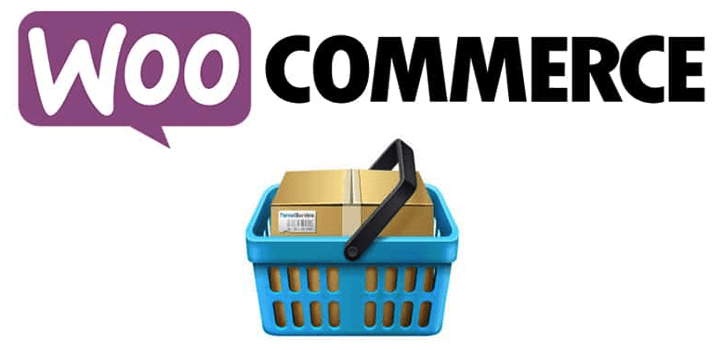
Rather than WordPress, which is also a stunning CMS for eCommerce, WooCommerce is here because it works with WordPress. It has over 75 million websites to its name. According to WordPress, it sees more than 400 million views and almost 24 billion pages monthly. With over 3 million users on this platform, you can instantly transform a website into a booming online store at the click of a button.
As one of the largest online CMS eCommerce community, it has numerous features, including plugins and extension with little technical difficulty.
Created in 2008 as WooThemes, the company moved to eCommerce in 2017 for small and medium businesses with a WordPress website. Today, it is a selling and buying eCommerce magnet drawing over millions of users in 32 countries across the world. WooCommerce is used by nearly five percent of known websites and powers almost 30 percent of all eCommerce stores. As one of the leading CMS eCommerce platforms for 2020, it has the following features.
Features
- Instantly transforms your WordPress website to an eCommerce site
- Access to numerous plugins and extensions
- Seamless integration like 1-click selling and PayPal payment
Pros
- No shortages of plugins, extension, or themes
- Extremely easy to use and affordable
- No need for technical or computer knowledge
- Creating building, installing and setup is cheap
- Compatible with various payment platforms include mobile
- Countless integration and customization
- High data safe and security
Cons
- Cannot function on another website outside WordPress
- Must involve third-party plugins for functions like payment and management
WooCommerce CMS for eCommerce is affordable and sets up effortlessly too. You handle the security and maintenance of your website. Are you looking to start an online store easily? WooCommerce is a highly successful option, but you must have a WordPress account.
BigCommerce – Hosted eCommerce CMS Platform
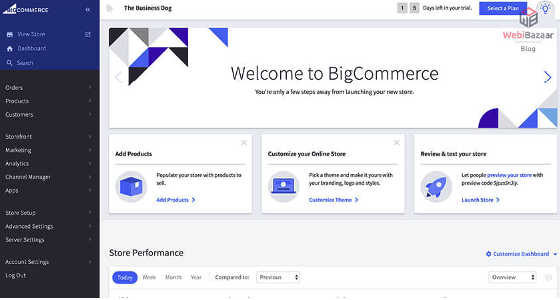
Like Shopify, BigCommerce is a software-as-a-service system offered hosted and paid eCommerce CMS solutions for online stores. Recently registered on the NASDAQ, it was created and launched in 2009 as a CMS online support platform to see to it that you grow as well as your business. It has achieved that immensely with its second-to-none community support system. Asides from connecting with customers via calls, emails, and text messages, it also updates its website with content and videos to help new and existing users get ahead.
Features
- Ability to connect with other CMS eCommerce sites and enjoy both features
- Very flexible and easy to customize, enabling users to update and change store design as desired
- Offers automated ordering process and compliant tax rules
- Provide in-house Google Analytics and AdWords experts
- Supports multiple languages and currency, making payment easier
- Incredible integration gateways that are easily customized
- Compatible with Amazon and Instagram
Pros
- Easy to use – no need for downloading or store anything
- Allows users to manage their digital shop via the web efficiently
- Enjoy one month free trial on any plan of choice
- Ability to link to other channels and make sales
- Enjoy unlimited bandwidth
- Enjoy access to countless add-ons, templates, and themes
- Cost-effective and affordable compared to other CMS eCommerce platforms
Cons
- The themes and add-ons could be better
- Compared with other SaaS platform, it is a bit pricey
- It does not facilitate RSS feeds
Overall, BigCommerce is a simple and versatile eCommerce CMS platform for merchants who want a plug and play solution. Although the simple plan offers more than you need to build a successful storefront, you might need to switch to a premium plan to enjoy more themes and plugins. Additionally, BigCommerce has the best CMS shopping cart reminder even better than Shopify.
Today, it has over 55,000 users, including big names like Martha Stewart, Toyota, and others. By and large, it is a powerful CMS eCommerce platform for fast and growing businesses of all sizes. Learn more with this video on BigCommerce.
Prestashop – Self-Hosted and Hosted CMS eCommerce Platform

What started out as a student project in 2005 in France is now one of the hottest and simplest CMS for an e-commerce platform in more languages for users across the world. This is another exceptional open-source platform but offers hosted open for online stores too. Today, this elegantly accessible CMS eCommerce has over 300,000 merchants customizing their stores daily to suit their purpose.
PrestaShop is not suitable for large multiple level businesses but works exceptionally well for small and medium eCommerce stores and people with zero tech knowledge about computers.
Features
- Ability to design every step of your website without stress
- Easily add products and allows customers to download and sell customized products on their online store
- Full control over the number of products on your websites
- Configure and customize payment systems, shipping, and product displays
- Seamless integration and excellent CMS shopping cart
Pros
- Very easy to use
- Offers free, open-source CMS shopping cart
- User-friendly with a fair learning curve
- It is a free, open-source eCommerce CMS platform
- Ability for you to customize, install, modify and produce your page without stress
- Choose between open-source or hosted with your technical know-how
- Supports reliable and secure payment gateways like Google Checkout and PayPal
Cons
- Scalability is limited
- Not suitable for large online store
- Add-ons are pricey
Overall, it is an amazing CMS eCommerce platform for newbies into the eCommerce world. The ease of use and customization are some of the best features and reasons why this platform endears to its users.
OpenCart – All-In-One eCommerce Content Management Platform

If you are looking for an e-commerce content management system with easy documentation free, open-source eCommerce CMS, then OpenCart is it. As one of the best online store eCommerce content management system based on PHP solution is a good start for businesses. However, you need a little technical knowledge. Furthermore, as good as this eCommerce CMS is, it does help to have some web design, development, and language knowledge to efficiently enjoy the functionalities of this platform.
The CMS eCommerce platform was launched by Daniel Kerr in 2005 to enable merchants to run their online stores and other online shops via a single backend. It is for this reason that OpenCart is the best CMS eCommerce content management system. So if you have more than one online store and want to manage them from one end, you know where to come – OpenCart.
Features
- User and SEO-friendly platform
- Simple documentation process
- Supports multiple language and currencies
- Countless categories and options to build a unique and stunning website
- PCI compliant and simple integrated payment gateway
- Google Analytical analysis and report
Pros
- A user-friendly interface makes it easier to create and setup.
- A simple admin interface for small and medium businesses
- Manageable cost
- Backend operation is straightforward and manageable
- CSS can be edited from your admin panel
Con
- Not the most scalable CMS platform
- Design features are limited.
- A steep learning curve
Overall, it is a great eCommerce CMS platform, but you must have some technical know-how to enjoy the amenities it provides for your online store.
CMS eCommerce Comparison Table
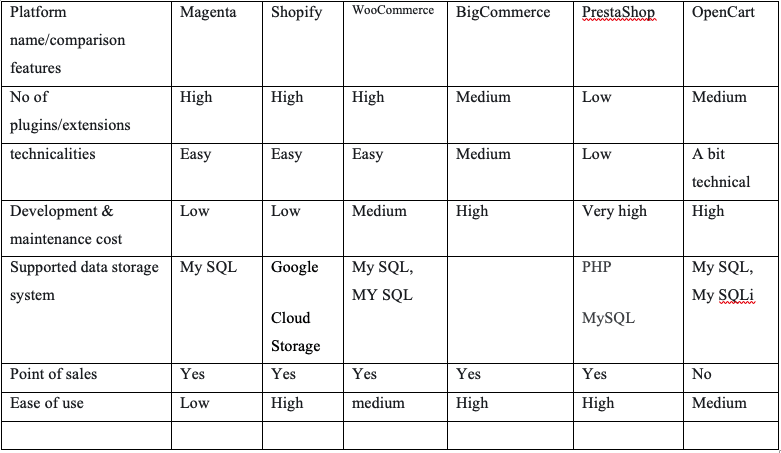
So what is the best CMS for eCommerce?
Well, that depends on what you are looking for. The decision is hosted or self-hosted and based on certain factors, including the size of the store and products. If your online store is small, you should stick to a hosted platform, like Shopify or BigCommerce.
If your store is big or expanding, then you need platforms that allow you to customize your shop with unique and incredible functionalities. In this case, your choice is self-hosted or open-source eCommerce CMS platforms like Magento and WooCommerce, among others.
Furthermore, if you are new to running an online store and want a platform, simple and requires less work, then PrestaShop and Opencart is the one to try out. However, if you have a blog page on WordPress, then WooCommerce is a simple CMS eCommerce interface to work with. Also, WordPress has a large base and growing with premium support to help you through the process.
If you are looking to create and implement customized solutions to your online store, then Magento is the platform for you.
Finally, CMS eCommerce is an individual choice, so endeavor to go through the features, pros, and cons before making a decision.



